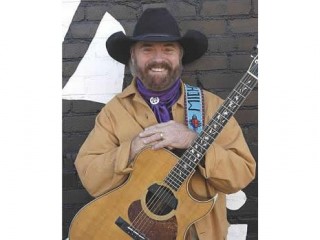
Michael Martin Murphey biography
Date of birth : 1945-03-14
Date of death : -
Birthplace : Oak Cliff, Texas, U.S.
Nationality : American
Category : Arts and Entertainment
Last modified : 2011-02-28
Credited as : Country music singer, Flowing Free Forever, The Yellow Rose of Texas
1 votes so far
Michael Martin Murphey was born in Oak Cliff, Texas, on March 14, 1945, and grew up in Dallas. He had a special love for cowboy stories and songs and also read avidly as a boy -- especially the work of Mark Twain and William Faulkner -- and was writing poetry before he was in his teens. He began performing as an amateur while in junior high school and within a few years was playing the clubs around Dallas in the early '60s, combining country, folk, and rock music. Somehow, despite the inherently conservative nature of all of those audiences, Murphey made it work, and he formed a band with a decent following in the area around Dallas.
He studied poetry and writing at the University of California and then signed on as a songwriter with Sparrow Music. By 1964, he was a popular figure in the folk clubs around Los Angeles and had formed a band with three like-minded musicians -- Mike Nesmith, John London and John Raines -- under the name the Trinity River Boys, who recorded a never-to-be-released album before disbanding.
In 1967, Murphey formed the Lewis & Clarke Expedition with Owen Castleman (aka Boomer Clarke). This group recorded one self-titled album and got a moderate hit out of the single, "I Feel Good (I Feel Bad)." It was around this time that the Monkees recorded Murphey's "What Am I Doing Hangin' 'Round?"
Murphey left Los Angeles in 1968 to take up residence in the San Gabriel Mountains where his songwriting blossomed anew. He was signed to Screen Gems (the publishing arm of Columbia Pictures) as a songwriter and had songs recorded by Flatt & Scruggs and Bobbie Gentry. However, Kenny Rogers gave Murphey his best showcase as a songwriter by cutting an entire album, The Ballad of Calico, comprised of songs Murphey had written about a Mojave Desert ghost town.
Back in the Austin, Texas, area during the early '70s, he resumed his singer-songwriter career and fell in with Jerry Jeff Walker, Willie Nelson and B.W. Stevenson. He also put together a new band that specialized in country-rock and folk-rock. In 1971, he signed his first solo recording contract on A&M Records. His first album, Geronimo's Cadillac (1972), yielded a modest hit in the title song, which was later covered by Hoyt Axton and taken up as an anthem by Native American civil rights activists. A second album, Cosmic Cowboy Souvenir, was well received critically and also a modest hit in the Austin area.
In 1974, Murphey moved to Epic Records, a division of Columbia, and recorded the first of six albums, Michael Murphey, that same year. His second album, Blue Sky - Night Thunder (1975) marked his commercial breakthrough. He had first heard the story from his grandfather about a ghost horse rescuing people on the desert. He dreamed of something similar one night as an adult and set it down to music and words in half an hour that same evening. The resulting song, "Wildfire," got to No. 3 on the pop charts in 1975 and became his first gold record. "Carolina in the Pines," another song from the same album, also made the Top 30.
He saw more success with Swans Against the Sun, which included his first country chart hit, "A Mansion on the Hill" and "Flowing Free Forever," both in 1976. "Cherokee Fiddle," from that album, was a modestly successful single for Murphey, but six years later Johnny Lee brought it into the Top 10 and into the movie Urban Cowboy. Up until 1981, he'd been known as Michael Murphey, but that year he began making a series of film acting appearances, starting with Gus Trikonis' Take This Job and Shove It, and began using his middle name in films and on albums, as a way of distinguishing himself from the actor Michael Murphy (Manhattan).
In 1982, Murphey signed a recording contract with Liberty Records, which yielded two original albums, Michael Martin Murphey and The Heart Never Lies, as well as a best-of collection with superb re-recordings of his A&M and Epic hits as well as his original Liberty hits "Still Taking Chances," "Love Affairs," "Don't Count the Rainy Days," "Will It Be Love," and "Radio Land," the latter a sort of country-flavored equivalent to "American Pie." The American Country Music Association named him 1983's best new male vocalist of the year. His rerecording of "Carolina in the Pines" rose to the country Top 10 in 1985, outperforming the original Epic version.
In 1985, Murphey moved to Warner Bros. records, making his debut on the label with Tonight We Ride. A year later he got to the country Top 5 with "A Face in the Crowd," recorded with Holly Dunn, then reached No. 1 with "A Long Line of Love." His chart success slackened after 1989 with "Never Givin' Up on Love," from the Clint Eastwood film Pink Cadillac that same year.
After that, Murphey returned to one of the first loves of his life, cowboy music. In 1990, he cut Cowboy Songs, an album of traditional and well-known songs from the genre, such as "The Yellow Rose of Texas" and "Tumbling Tumbleweeds." That record sold several times more than any of his other Warner Bros. releases. That success, in turn, led the label to establish its Warner Western imprint.
Though he now focuses on cowboy music, he also organizes a series of annual celebrations of the American West called West Fest. He issued Storm Over the Rangelands, a collection of songs about contemporary ranching life, in 2005.
















